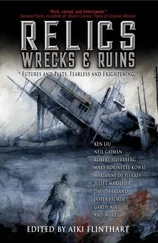When I left the bathroom, Jared was hitting the balls with the stick, stalking the table, scratching the crack of his ass. He was powerful and essential and doing just fine. I was in love, meaning I was addicted to a specific body; I was afraid.
—
A few days later, I tried to reassure my father — and myself — about the state of my new life in California by applying for an internship at the local paper. I had never dreamed of being a journalist, but this seemed like one way I might be able to put my feelings to use.
The newspaper office was marked by a small sign that looked like an ad for a newspaper in a children’s comic book: an illustration of a typewriter spewing a page that said Carp Weekly in bubbly letters. The interior was a fluorescent-lit room crammed with people, desks, books, papers, phones, computers covered in Post-it notes, fax machines, mugs, stale bagels. The chaos relaxed me. The woman who interviewed me looked damaged in a way that made her dull and approachable rather than threatening. She introduced herself as Sally — no last name, no title. She was impressed with my writing samples, even more so when I told her they were papers from a high school English class. The lie I’d planned — about having dropped out of the last semester of college to care for a dying parent — felt unnecessary. In fact, Sally seemed glad to learn I hadn’t gone to college, like it gave me some secret cachet. She even used the term “self-taught,” which sounded pretentious, but I did read a lot and obsessively analyze my thoughts — was that being “self-taught”? I learned from the card Sally handed me at the end of the interview that she was the managing editor.
The next day, she called and offered me not the unpaid internship but an actual job. They happened to be looking for someone to run the obituary section. I suggested that I might not be qualified. “Believe me, you’re overqualified,” Sally said. “The job is mostly dealing with crazies.” I set up an interview with the publisher, which Sally suggested was mostly a formality. Donnie asked me my favorite authors, was condescendingly impressed. Nine bucks an hour, no benefits; no wonder they were willing to overlook my inexperience. But I liked the idea of having a title: assistant editor.
They gave me a cubicle on the newsroom floor. Sally fielded my first phone call by way of training. “Thank you for your interest in Carp Weekly . I have to stress right off the bat that we do not publish typical obituaries. These are more like personal essays — stories rather than a rundown of events and accomplishments. If you would prefer to run a standard obituary, I am more than happy to refer you to our advertising department.” She hung up the phone, showed me the coffee machine and the microwave, left me to set up my email.
As I was struggling with an Ethernet cord, a middle-aged man came out of the office next to mine, and sans intro — the kind of shorthand I soon learned to associate with him — started telling me about a woman who had been murdered by her ex-husband a few days ago. “Been divorced for twenty-five years. At least the douche bag never found anyone else to hate. Small consolation, I grant.” Joe was pale and lanky with faintly humped shoulders, but his voice made him seem like he tossed pianos for fun. “She was a retired teacher, had a little house with a garden, named Effie or something like that. You get the picture.” His phone rang. He returned to his desk in two strides. “Yello,” he belted. “Thanks for the callback. So listen, what the fuck is up with this cat running for city council?” Less than a second elapsed between the end of his phone call and his reappearance at my desk. “So the woman’s got a sister. Only kin mentioned in the daily. What I’d do, if I were you, is look up that sister.” Joe carried on the conversation like this, bounding between my desk and his, sometimes picking up his thoughts mid-sentence.
I was dismayed by how easy it was to track down the sister’s name and phone number. I was often nervous calling a friend to ask if she wanted to get a drink when I was alone in my house, and now I was supposed to dial a stranger and ask if she wanted to write an essay for me on her recently murdered sister, while I was surrounded by coworkers with hard, avid faces, jamming down computer keys and talking loudly into headsets (“ Carp Weekly , Bill speaking”). I told myself I could quit tomorrow, just make the call, there was nothing riding on this. But every time I was about to press the last digit, I panicked and hung up, fidgeted with my empty Rolodex. At last, I took my purse and slipped out the back door. I made the call from the parking lot. When the sister answered, I repeated Sally’s spiel about our obituaries being more like personal essays. The sister asked my name, told me how relieved she was that I called. She wanted so much for there to be an obituary about Barb but her eyesight was bad and she could no longer type. Was there any way — and please tell her if this was inexcusably rude, she was not entirely in her right mind at the moment — but perhaps, maybe, was there any way she could tell me her memories and I could type them up?
I started offering this dictation service whenever I requested an essay. I made the calls from my cubicle once I realized that everyone was too harried to notice anyone else. For a while, the work suited me in the way it suited Joe to be a reporter. He never seemed to be in conflict with himself, even when he was screaming into his phone, “You wanna hear libel? Go on and sue me and hear what this town has to say about your quote unquote business . You know, pal, it’s never too late to stop wasting your life being an asshole.” He slammed down the phone, stood in his doorway eating a doughnut, shouted at me from across the newsroom. “We gotta get something good for the Iraq vet who shot himself and his dad. Look up his girlfriend. Word of advice: Don’t mention a goddamn thing about the Middle East or IEDs or PTSD. You just let her remember him — color of his cuticles, favorite license plate number, all that shit. Then she might actually open up to me when I call.”
I loved being near Joe’s devotion, and I liked being implicated in the socially condoned spectacle of unhinged death-grief. It made me feel less alone, a kind of selfishness I accepted in myself.
—
Jared would sometimes use his belt on me, never against my will. He didn’t hit hard. He’d hold my arms down and place his teeth around my nipple, poised to clamp down. “Stop, stop, stop,” I’d say and he’d tell me to shut up, backhanding my jaw. He’d order me to take my clothes off, but it never became more sexual than that. This wasn’t about sex. It was about having power over life. Jared wanted to believe he had some and I wanted to give all mine away. I wanted bruises, empirical proof of the destructiveness of emotions. The first time he hit me too hard, I winced and put my hand to my jaw. He fell on me with a look of terror and wet my face with kisses. “Sweetie, baby, oh no, did I hurt you?”
Because yes and no were both the wrong answer, we kept pushing the limit. We wanted more — longer strangulations, redder marks, deeper and murkier troughs of shame and forgiveness. Sometimes when Jared got up to pee in the night and I watched his buttocks moving toward the toilet, exhausted and trusting, the whitest thing in the room, I felt a tenderness I could not bear without violence. It was the same feeling that kept me awake at night in junior high, scratching at my chest until I drew blood. Sometime in seventh grade, I developed a nearly constant irritation in my chest, like tiny claws scratching me from the inside. My annoyment knot, I called it, but only to myself. Some nights I’d claw at my chest until I felt warm wetness beneath my fingernails; then I’d lie awake thinking that there was something seriously wrong with me and I needed to find the right person to make it better. The knot sometimes compelled me to wear something weird to school — a flowered shower cap or jeans with one leg cut off and the other long or leotards snapped over the crotch of my jeans instead of under them. There had to be something you could do.
Читать дальше












